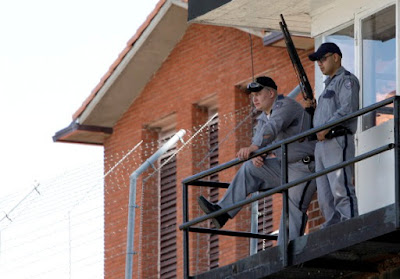 |
| The Walls Unit, Huntsville, Texas |
The death penalty is rare, even in Texas, where just seven executions were carried out this year. In some places, it's almost nonexistent. In Dallas and Harris counties, not a single death sentence was handed down this year.
This is good news.
Executions are costly. Their value in deterring would-be murderers and others from committing their crimes is small. And they are disproportionately carried out against persons of color. Of the nine men sentenced to death in Dallas or Tarrant counties since 2012, all are African-American. In Harris County, 15 of the 18 more recent death sentences have been handed down against black defendants, the other three against Latinos.
Worst of all, an execution is the outcome of an error-prone system, and one that simply can't be undone once carried out.
That insight was at the heart of the ruling 45 years ago next year in which the U.S. Supreme Court ruled 5-4 that the death penalty violated the Constitution.
"The penalty of death differs from all other forms of criminal punishment, not in degree but in kind," Justice Potter Stewart wrote in one of five concurring opinions in Furman vs. Georgia. "It is unique in its total irrevocability. It is unique in its rejection of rehabilitation of the convict as a basic purpose of criminal justice."
Four years later, the court ruled that with proper attention to racial fairness and other factors, the executions could resume. But ever since, Texas has had a starring role in demonstrating just how naive that second decision was.
It's distressing to note that support for the death penalty remains strong in many states, including Texas (though that support is at its lowest level in decades). There is hope in the fact that actual use of the death penalty is fading fast.
In the past five years, 26 inmates on Texas' death row have been removed. Eighteen saw their sentences reduced. Seven died in custody. One was exonerated and released.
Even Texas' famously tough-on-crime Court of Criminal Appeals has grown far more careful when it comes to executions. In the past two years, the court has issued a total of 15 stays of execution. In the three years before that, it averaged just one per year.
Nationwide, the use of the death penalty is also at a low.
It's encouraging, too, to see Justice Stephen Breyer continue his sometimes-lonely crusade to convince the rest of the court to take up again, as they did in 1972 and 1976, the overall question of whether the Bill of Rights prohibits executions.
The penalty is so rare and so random in its application, it should no longer be tolerated: "Individuals who are executed are not the 'worst of the worst,'" Breyer wrote Dec. 12, "but, rather, are individuals chosen at random, on the basis, perhaps of geography, perhaps of the views of individual prosecutors, or still worse on the basis of race."
Source: Dallas News, Editorial, December 27, 2016
⚑ | Report an error, an omission; suggest a story or a new angle to an existing story; submit a piece; recommend a resource; contact the webmaster, contact us: deathpenaltynews@gmail.com.
Opposed to Capital Punishment? Help us keep this blog up and running! DONATE!


0 nhận xét:
Post a Comment